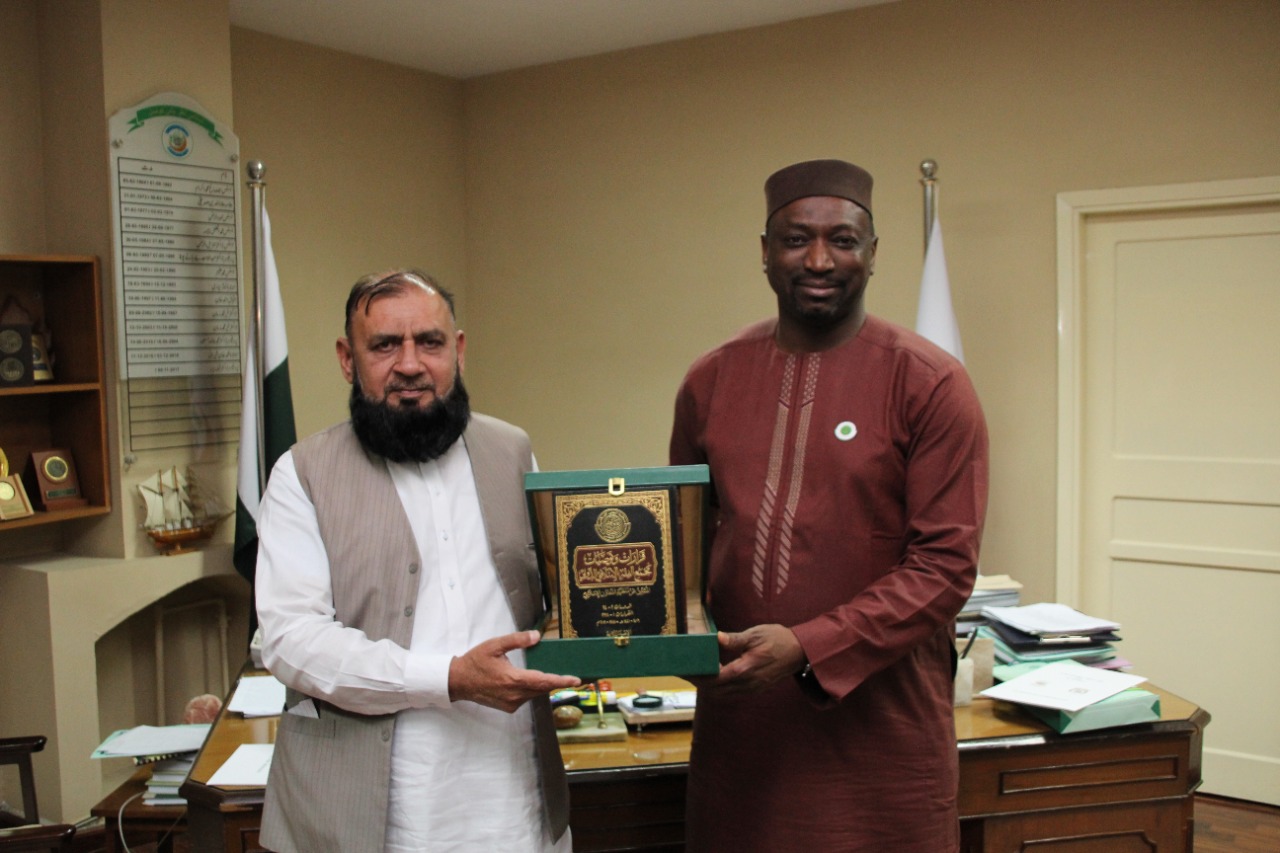
Within the framework of the International Islamic Fiqh Academy’s (IIFA) persistent and continuous endeavor to build more relations of cooperation, communication and partnership with the higher authorities responsible for managing religious affairs within the member states of the Organization of Islamic Cooperation (OIC), and its desire to coordinate efforts, enhance knowledge integration, and intellectual exchange between the Ummah’s scholars with the supreme and first jurisprudential authority of the member states of the OIC, and in appreciation of the pivotal role played by the Council of Islamic Thought, as the supreme legal reference for the Islamic Republic of Pakistan in the field of guidance, rectification and rationalization, promoting the method of moderation and spreading a culture of tolerance, harmony and peaceful coexistence among followers of religions, sects and beliefs in order to preserve the order of the Ummah and social peace in Pakistan. Accordingly, His Excellency Prof. Koutoub Moustapha Sano, Secretary General of the Academy, and his accompanying delegation, held on Thursday, 21 Sha’ban 1443H corresponding to 24 March 2022G, a meeting with the Council of Islamic Thought at the Council’s headquarters in Islamabad, the Islamic Republic of Pakistan.
On behalf of the President of the Council, His Eminence Dr. Qibla Ayaz, who was on an official mission outside the capital, His Excellency Dr. Hafez Ikram al-Haq, Secretary General of the Council, welcomed His Excellency the Secretary General of the Academy and the accompanying delegation, expressing his great happiness at the Academy’s delegation visit to the Council, and his aspiration to strengthen the bonds of cooperation and coordination between the two institutions who have a long-standing partnership of more than three decades. His Eminence then presented an extensive overview of the Council, its history, mission, goals, and members, stressing the Council’s desire to make maximum use of the Academy’s resolutions, recommendations, and publications, as well as organizing panel discussions and specialized seminars on various issues and topics of common interest. He concluded by expressing the thanks of His Excellency the President of the Council in particular, and all its members in general, for the approval of the Academy to sign a cooperation agreement between the two institutions at the end of the meeting.
For his part, His Excellency the Secretary General of the Academy expressed his great thanks and great appreciation for the warm reception and gracious welcome to him and the delegation at the Council’s headquarters, praising the distinguished intellectual efforts and appreciable practical achievements made by the Council during the past six decades, which maintained and still maintains social peace and harmony, peaceful coexistence and solid harmony between the components of society with their different religions and sects. His Excellency also expressed his great pleasure in the diversity that characterizes the members of the Council, which is reflects its wise openness to the membership of followers of other religions among the Pakistani citizens, in respect of the principle of freedom of religion and choice, and in commitment to the requirements of citizenship. He pointed out, in the meantime, that this is a responsible application of the Madinah Charter which included fixed principles, clear values, and noble foundations for the pillars of a comprehensive citizenship that embraces all citizens regardless of their religions, beliefs and sects.
On the other hand, His Excellency took this opportunity to express the Academy’s great thanks and appreciation from the presidency, the general secretariat , members and experts to the wise Pakistani leadership for its continuous defense of the rights and interests of Muslims everywhere in the world, congratulating them, in particular, for the blessed historical efforts that culminated a few days ago, in the United Nations General Assembly declaring the fifteenth (15) of March of each year as the International Day to Combat Islamophobia. His Excellency also praised the continuous support and generous care that the Academy has enjoyed since its establishment to this day. In the meantime, he noted the Academy’s full readiness to enhance cooperation, communication and coordination with scientific and religious institutions and centers, especially the Council and the Ministry, in order to organize specialized scientific seminars and hold international conferences aimed at formulating an integrated plan of action to combat the phenomenon of fear of Islam (= Islamophobia) in a systematic scientific and practical manner, and reject fanaticism, extremism, and terrorism.
His Excellency also expressed his warm welcome for the signing of a cooperation and partnership agreement between the Academy and the Council at the end of the meeting, explaining that this agreement represents a renewal of the existing relations of cooperation and communication between the two institutions, and that signing it today aims to raise these relations to a more organized and planned level, and in implementation of its terms and articles.
Then the two sides exchanged cordial conversation on various issues and topics of concern to Muslims in the South Asian region, especially in Afghanistan, and agreed to cooperate, communicate and coordinate in order to enable the Academy to implement the decision of the OIC, which requires the Academy to lead the Ummah’s scholars delegation to visit Afghanistan for discussion and dialogue on ways to promote moderation and spread a culture of moderation, tolerance and coexistence, and access to education and work opportunities for both sexes in Islam, and other issues and topics of concern to Muslims in Afghanistan.
The two parties concluded the meeting by signing a cooperation agreement, ushering the beginning of a new phase of close cooperation, communication and coordination between the two institutions. His Excellency was accompanied by Ms. Sarah bint Amjad Hussein, Director of Family and Women’s Affairs Department at the Academy, and Mr. Amjad Ibrahim Al-Mansi, Head of the Protocol Division at the Academy.
It is worth mentioning that the Council of Islamic Thought is a supreme federal body established in 1962 and is concerned with giving legal advice to the government and parliament. Its most important tasks are to propose laws in accordance with the Qur’an and Sunnah to Parliament and regional councils; advising and answering to Parliament, the prime minister, and provincial governors on any question referred to it, and on whether or not the proposed law is contrary to the teachings of Islam. It also makes recommendations to harmonize existing laws with the teachings of Shariah. Its members consist of scholars representing the Islamic religion and representatives of religious minorities of Hindus and Sikhs.

Read Also
Lastest








